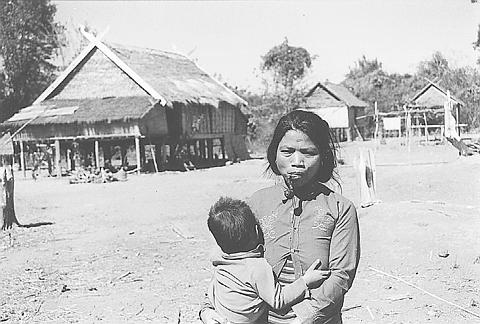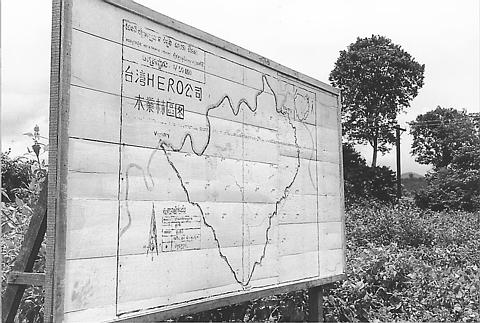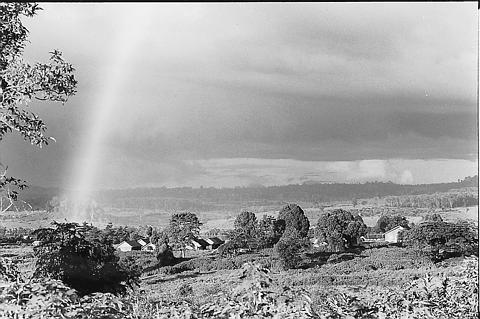At first glance the ethnic Kreung hill tribe village of Phum Svay has achieved a successful balance between the demands of traditional culture and the encroachment of modernity.
Here in this clearing in the heart of Ratanakiri province in northern Cambodia, villagers long ago shed their customary colorful hill tribe clothing for T-shirts and trousers, even as they carry on the subsistence slash-and-burn agriculture that has sustained them for centuries.
And while the traditional Kreung longhouse in the center of this community of 90 people is of the same design and materials as that used by village forefathers, the structure is crowned with painstakingly carved renditions of UN helicopters and a Russian MiG jet.

PHOTO : ANDY EAMES
Beneath these surface impressions of harmony between the old and the new, however, Phum Svay is a war zone in a battle that pits the Kreung's spiritual and economic traditions against the diesel-powered, military-backed muscle of the Hero Taiwan logging company.
Since January 1999, Hero Taiwan has been hard at work ripping the heart out of the culture and spiritual life of the Kreung by conducting logging operations in areas the Kreung designate as "spirit forests."
Hero Taiwan's actions are one part of Taiwan's long-touted "Go South" investment policy.

PHOTO: PHELIM KYNE
Already notorious throughout Southeast Asia for widely documented abuses of garment factory laborers, Taiwanese are now joining the ranks of Malaysian and Chinese companies accused of pillaging Cambodia's vast timber reserves.
Although Hero Taiwan was granted a legal concession by the Cambodian government to log the area around Phum Svay, the Kreung insist that the damage inflicted on the Spirit Forests is tantamount to cultural genocide.
"The Spirit Forests are where our people go to live after they die," said Yong Chanam, the chief of Phum Svay village.

PHOTO: ANDY EAMES
The forests are significant for other reasons. "When a couple is expecting a baby," he says, "they have a dream of the Spirit Forests, and the forest gods send them a child."
Unfortunately for the Kreung, the same factors that enhance the spiritual value of the Spirit Forests add to their commercial value to Hero Taiwan.
"Spirit Forests are located on the tops of the hills covered by the biggest, oldest trees," Chanam said.
The logging of the Kreung's Spirit Forests has wrought severe disruption on the lives of the people of Phum Svay and neighboring Kreung villages.
"The forest gods are very angry. ... We can hear the sounds of screaming and the beating of drums from the forests that show their anger," Chanam said. "Four people in our village have died since the logging started because the forest gods are upset."
A more tangible threat posed by Hero Taiwan's logging of the Spirit Forests is its impact on the Kreung's carefully balanced relationship with the forest ecosystem that they inhabit.
"We rely on the Spirit Forests to provide medicine, rattan plant leaves for roofs and vines for ropes," Chanam said. "The Spirit Forests also have wildlife you can't see in other places, like tigers and tonsaung [wild forest cows]."
Hero Taiwan's actions around Phum Svay are not just a violation of the sacred beliefs of indigenous forest people. According to environmentalists and government officials, Hero is also in direct contravention of a logging concession management plan formulated by the Cambodian government with World Bank support.
The plan stipulates that logging concession areas must be planned in accordance with consultations with local inhabitants -- in particular, indigenous hill tribes.
According to Chanam, no such consultation occurred before the chain saws of Hero Taiwan's logging crews went to work on the Spirit Forests around Phum Svay.
Such news comes as no surprise to Patrick Alley, who as director of the environmental watchdog organization Global Witness has closely monitored the depredations of logging companies in Cambodia since 1994.
"I personally witnessed Royal Cambodian Armed Forces [RCAF] personnel logging for Hero outside of their concession area in January 1999, before they were allowed to cut anywhere," Alley said. "The fact that we have also documented their illegal activities before, as have others, and they still get preferential treatment, strongly suggests that they have some powerful friends."
Efforts to meet with Hero Taiwan management at their huge sawmill facility in the Ratanakiri provincial capital of Banlung provided a telling indication of some of the company's "powerful friends."
The sawmill complex can easily be mistaken for a military installation, with armed RCAF guards patrolling the inside perimeter of the high wooden fence that surrounds the facility.
A no-nonsense RCAF officer manning the Hero Taiwan sawmill gate insisted that company policy required potential visitors to receive prior permission from the Ratanakiri Provincial Government before being able to meet with Hero personnel.
Taking photographs of the complex from outside its perimeter prompted warnings that Hero Taiwan's RCAF security force had the right to seize any "suspicious" photographic equipment in the vicinity of the sawmill.
The cozy relations between Cambodian military and political officials and Hero Taiwan stands in stark contrast to the state of official relations between the two states.
Prime Minister Hun Sen's government's broke all ties with Taipei in 1997 following allegations that representatives of the semi-official Taipei Commercial Trade Office had funneled arms to forces loyal to Hun Sen's then-rival, Prince Norodom Ranarridh, prior to the July 1997 coup.
Economic relations, however, have flourished, with more than US$6 million of much-needed Taiwanese investment, much of it in the garment sector, flowing into Cambodia in 1999 alone.
Accompanying that investment, however, have come accusations that Taiwanese money has been used to facilitate "cooperation" from underpaid Cambodian civil servants and military officials in everything from labor disputes to protests over environmental damage caused by Taiwanese companies.
Residents of Phum Svay claim to have experienced abuse at the hands of Cambodian officials who villagers claim are de facto representatives of Hero Taiwan.
In June 1999, Phum Svay residents seized some Hero Taiwan equipment to press home their demands that logging operations in the Spirit Forests be ceased.
The equipment was subsequently surrendered to Hero Taiwan logging crews after a token payment of compensation and an assurance that logging in the Spirit Forests would be halted immediately.
Instead, Chanam was called two days later to a meeting with the district governor, who, flanked by heavily armed soldiers, insisted that the village chief thumbprint a contract forgoing any claims to the lands upon which the Spirit Forests stood.
"The district governor said, `You're not the head man here, Hun Sen is the head man,'" Chanam recalled. "He said if we tried to protect our land, [Hero Taiwan] would cut the forests anyway."
"That's a groundless accusation," said Chhay Veth, director of the Ratanakiri Department of Forestry, in response to Chanam's account of the encounter between villagers and provincial government officials.
Veth describes Chanam's explanation of events as "mistaken," and based on two previous occasions in which Chanam provided thumbprints for deals the Phum Svay villagers struck with Hero Taiwan for the construction of roads and a village school.
According to Veth, the discovery of the existence of the Spirit Forests was "a surprise" for both Hero Taiwan and provincial government authorities.
Veth claimed that both the government and Hero Taiwan were actively seeking to harmonize the Kreung's traditional belief systems with the legal rights of Hero Taiwan to the area's timber.
"In the future we want to make sure that logging occurs outside of the Spirit Forests area, but it's difficult because there are no laws or experts to determine the [Spirit Forests'] boundaries," Veth said. "If the Kreung are allowed to decide on the boundaries of the Spirit Forests, the area will be too big."
Chanam confirmed that a recent seminar involving environmental and legal organizations concerned with the Kreung Spirit Forests issue had led to a decision to appoint five Hero Taiwan representatives to work together with Phum Svay residents to delineate the borders of the Kreung Spirit Forests.
However, with the prospect of a renewal of logging in the area when the dry season begins in late autumn, Chanam remains skeptical whether Hero Taiwan will respect any agreement made with the villagers.
"We'll abide by a fair decision [regarding the Spirit Forests' borders], but we really don't know if Hero will," Chanam said.

Authorities have detained three former Taiwan Semiconductor Manufacturing Co (TMSC, 台積電) employees on suspicion of compromising classified technology used in making 2-nanometer chips, the Taiwan High Prosecutors’ Office said yesterday. Prosecutors are holding a former TSMC engineer surnamed Chen (陳) and two recently sacked TSMC engineers, including one person surnamed Wu (吳) in detention with restricted communication, following an investigation launched on July 25, a statement said. The announcement came a day after Nikkei Asia reported on the technology theft in an exclusive story, saying TSMC had fired two workers for contravening data rules on advanced chipmaking technology. Two-nanometer wafers are the most

NEW GEAR: On top of the new Tien Kung IV air defense missiles, the military is expected to place orders for a new combat vehicle next year for delivery in 2028 Mass production of Tien Kung IV (Sky Bow IV) missiles is expected to start next year, with plans to order 122 pods, the Ministry of National Defense’s (MND) latest list of regulated military material showed. The document said that the armed forces would obtain 46 pods of the air defense missiles next year and 76 pods the year after that. The Tien Kung IV is designed to intercept cruise missiles and ballistic missiles to an altitude of 70km, compared with the 60km maximum altitude achieved by the Missile Segment Enhancement variant of PAC-3 systems. A defense source said yesterday that the number of

A bipartisan group of US representatives have introduced a draft US-Taiwan Defense Innovation Partnership bill, aimed at accelerating defense technology collaboration between Taiwan and the US in response to ongoing aggression by the Chinese Communist Party (CCP). The bill was introduced by US representatives Zach Nunn and Jill Tokuda, with US House Select Committee on the Chinese Communist Party Chairman John Moolenaar and US Representative Ashley Hinson joining as original cosponsors, a news release issued by Tokuda’s office on Thursday said. The draft bill “directs the US Department of Defense to work directly with Taiwan’s Ministry of National Defense through their respective

Tsunami waves were possible in three areas of Kamchatka in Russia’s Far East, the Russian Ministry for Emergency Services said yesterday after a magnitude 7.0 earthquake hit the nearby Kuril Islands. “The expected wave heights are low, but you must still move away from the shore,” the ministry said on the Telegram messaging app, after the latest seismic activity in the area. However, the Pacific Tsunami Warning System in Hawaii said there was no tsunami warning after the quake. The Russian tsunami alert was later canceled. Overnight, the Krasheninnikov volcano in Kamchatka erupted for the first time in 600 years, Russia’s RIA